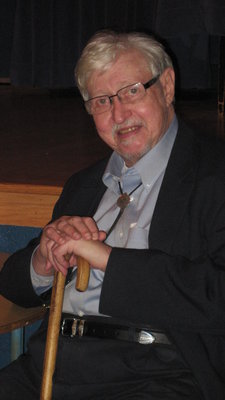Buy your beer before July the first
If you don’t you’ll surely die of thirst
No more schnapps with your liverwurst
After July the first —Old folk song commemorating July 1, 1919, the start of Prohibition in the U.S.
If there’s anything that can be learned from Prohibition, and the history of speakeasies in the United States, perhaps it’s that people will go to extraordinary lengths to drink spirited libations – even after July the first.
That at least is the takeaway message after listening to Jersey City historian Bob Leach offer up one of his “old time tales” presentations on local speakeasies.
“I am from Jersey City and I am as wet as the Atlantic Ocean.” – Edward Irving Edwards
________
Tavern to café
Prior to Prohibition, the selling of alcoholic beverages was, not surprisingly, a very lucrative venture for many businesses, from beer and liquor manufactures to the local corner tavern. When Prohibition officially began on July 1, 1919, according to Leach, many former taverns officially became cafés overnight.
But their real business, and profits, were still tied to the selling of liquor.
“By day, these cafés could serve food and coffee. But at night you would go to the back door, usually give some password, and be let in to drink bootleg liquor,” said Leach. “These were the speakeasies. Nearly every former tavern in Jersey City that became a café was, by night, a speakeasy.”
The Grape Vine Tavern, at 657 Newark Ave., which is one of the oldest bars in Jersey City, was a well-known speakeasy, as was a former union hall at Sip and Summit avenues near Journal Square.
Unlike other speakeasies, patrons didn’t enter the union hall through a true back door. Instead, they accessed the hall through a phone booth in a cigar shop located next door.
Inventive customers and barkeepers found various ways to skirt the restrictive liquor laws, including the sale of “near beer, a legal nonalcoholic product that was readily available.
“Near beer was very popular because it could be easily converted into an alcoholic beverage called ‘needle beer,’ ” Leach noted. “You would go into a café or a former tavern. You would order a bottle of near beer and you would slap your forearm to signify a needle. The bar man would have a hypodermic needle of alcohol” that would be used to inject liquor into the near beer.
Sometimes an entire barrel of near beer would get spiked with alcohol is a similar way.
“Prohibition was never really enforced in New Jersey,” said Leach. When former New Jersey Governor Edward Irving Edwards ran for office in 1919, “he ran on the ‘wet ticket,’ ” said Leach, meaning Edwards opposed Prohibition. “He made a speech down in Atlantic City, ‘I am from Jersey City and I am as wet as the Atlantic Ocean.’ That’s how he declared his wet credentials. Edwards swore that if elected and Prohibition became the law of the land he would not enforce it. And he didn’t.”
Gov. Edwards, a former president and chairman of the board of First National Bank of Jersey City, was famously known to have placed a bottle of bootleg whiskey in a time capsule laid in the cornerstone of the bank’s building at 1 Exchange place in 1922. That time capsule has never been disturbed, according to Leach, and Edwards’ bootleg whiskey is still right where he put it.
Union halls and social organizations like the Elks Club – many of which had offices around Journal Square – offered other respites from the strict anti-drinking laws of the time, in addition to the cafes.
Under the Vostead Act, the law passed by the U.S. Congress instituting Prohibition, rabbis, priests/reverends, and pharmacists were among the few people who could legally use and dispense alcohol for either religious or medicinal purposes.
Some were known to abuse their position.
“One of the biggest sellers of bootleg booze in Jersey City was Rexall Drugs,” insisted Leach.
Women’s temperance
Since many of the social and professional spaces that could easily skirt the laws of Prohibition were the domains of men, the Reporter asked Leach where this left women drinkers.
He reminded that even before the Volstead Act there had been laws against women being seen in bars or saloons. Ironically, Leach said speakeasies continued this discrimination even as they thumbed their noses at anti-drinking laws.
“Of course the flapper came of age during the Jazz Age, and they would have been drinking and smoking, but probably not in Jersey City,” said Leach. “When Prohibition came along, even though these places went undercover, they still obeyed the customary laws, which forbade women at barrooms in Jersey City.”
Many of Leach’s speakeasy tales came to him through oral histories passed along to him by older members of his family who lived through the Prohibition era and who remembered what the period was like.
While there are plenty of books on Prohibition and speakeasies, he said much of the history has been lost.
“When the Volstead Act was repealed, part of the law said that any business that had been a speakeasy couldn’t get a new liquor license,” he said. “So, a lot of them destroyed their records.”
E-mail E. Assata Wright at awright@hudsonreporter.com.
